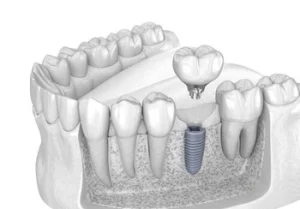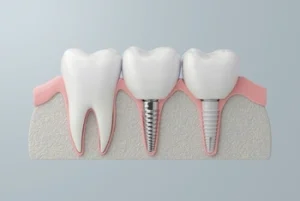Dental implants are a stable and natural-looking replacement for missing teeth. While the procedure is designed with precision and modern techniques to promote minimal discomfort, it’s natural to experience some soreness or tenderness following surgery. Understanding how to relieve pain from dental implant procedures can help you feel comfortable and support your healing process.
This guide will help you understand what to expect after dental implant surgery, how to manage discomfort, and when to seek professional guidance to ensure a smooth recovery.
Understanding Dental Implant Pain
It’s common to feel mild discomfort after undergoing dental implant surgery. The sensation often resembles what you might experience after other oral surgery procedures. While dental implants themselves do not inflict pain once healed, the body’s natural response to surgery can cause temporary swelling, tenderness, or a dull ache around the implant site.
Your dentist uses local anaesthesia to ensure your comfort during the dental implant procedure. Once the anaesthetic wears off, you may notice mild soreness as your body begins to heal. This is a normal part of recovery and generally improves within a few days.
Why Pain Occurs After Dental Implant Surgery

The level of pain may vary depending on several factors:
- The Number of Implants Placed: More implants may require a longer recovery period.
- The Complexity of the Surgical Procedure: Some cases involve bone grafting or sinus lifts.
- Individual Healing Responses: Every person’s body heals differently.
Typically, patients report only mild to moderate discomfort, gradually lessening as healing progresses.
Immediate Post-Surgery Dental Care
The first 24 to 48 hours after implant surgery are essential for establishing a comfortable recovery. Following your dentist’s instructions carefully can help reduce swelling and relieve pain.
Here are a few key recommendations:
Apply an Ice Pack
Place an ice pack outside your face near the implant area for short intervals (around 15–20 minutes). This can help minimise swelling and soothe the area.
Rest and Avoid Strain
Adequate sleep and rest significantly contribute to faster healing. During the initial days, avoid heavy lifting, vigorous exercise, or activities that increase blood circulation to the head.
Stick to a Soft Food Diet
A soft-food diet helps prevent pressure on the implant site. Soups, mashed vegetables, smoothies, and yoghurt are ideal options. Stay away from hard or crunchy foods that may disturb the implant area.
Pain Relief Options After the Dental Implant Process
Understanding how to relieve pain from dental implant recovery involves knowing your available pain management options. Your dental team may recommend:
- Over-the-Counter Pain Relief Medication: These can help manage mild discomfort.
- Prescription Medication: Sometimes, your dentist may prescribe stronger medication for short-term use.
- Warm Salt Water Rinses: After 24 hours, rinsing your mouth with salt water helps soothe tissues and prevent infection.
Always follow your dentist’s advice regarding pain relief and medication usage.
Managing Swelling and Discomfort
Swelling around the surgical area is normal after oral surgery. It typically peaks within the first 48 hours and gradually subsides. To manage swelling effectively:
- Continue applying ice packs during the first day.
- Keep your head slightly elevated when resting.
- Avoid touching or disturbing the implant site.
Contact your dentist for a professional assessment if excessive swelling persists beyond a few days.
Supporting the Healing Process
During the dental implant recovery period, the jawbone gradually integrates with the titanium post, a process known as osseointegration. This phase can take a few months and plays a role in the stability of your dental implant.

- Avoid smoking, as it can delay healing.
- Refrain from alcohol consumption during the early recovery phase.
- Eat nutritious foods rich in vitamins and protein.
- Attend regular dental check-ups to monitor progress.
Your dentist will review how your implant is healing and may schedule follow-up visits to ensure proper integration.
Maintaining Gentle Oral Hygiene
Maintaining a clean mouth is key for a favourable recovery. However, practising gentle oral hygiene is important to avoid disturbing the implant area.
- Use a soft-bristle toothbrush and carefully clean around your natural teeth.
- Avoid brushing over the implant site for the first few days.
- Use an antibacterial mouthwash recommended by your dental professional to minimise bacteria and promote optimal healing.
A clean mouth prevents complications such as infection and supports the healing process.
Recognising When to Contact Your Dentist
While some mild discomfort is part of the normal healing process following a dental implant procedure, it’s important to be aware of symptoms that may indicate the need for further assessment. Recognising these early signs can help prevent complications and ensure your implant site heals as intended.
You should contact your dentist immediately if you experience any of the following:
- Persistent Pain That Does Not Go Away with Medication: Mild soreness is typical, but pain that remains intense or does not ease with recommended pain relief may indicate inflammation, infection, or pressure on surrounding tissues.
- Excessive Swelling or Bleeding: Some swelling is normal during the first 48 hours, but if it continues to increase or is accompanied by ongoing bleeding, professional evaluation is advised.
- Signs of Infection: If bacteria enter the surgical site, infection can occur around the implant or gum area. Prompt treatment is key to preventing the infection from spreading or affecting the implant’s stability.
- Numbness That Does Not Subside After Several Hours: Local anaesthetic effects should wear off within a few hours after surgery. If numbness or tingling persists, it could suggest irritation or compression of a nearby nerve.
- Movement of the Implant or Dental Crown: Dental implants should remain stable during healing. Any noticeable implant or dental crown movement may indicate inadequate integration with the jawbone or implant failure, requiring immediate attention.
If any of these symptoms occur, it is recommended that you do not wait for them to resolve independently. Contact your dental team for a professional assessment. Early intervention can help manage discomfort, protect surrounding tissues, and prevent potential complications such as implant instability or infection.
Your dentist will evaluate the implant site, identify possible causes, and recommend an appropriate course of action, which may include adjustments to your oral hygiene routine, medication, or, in some cases, minor corrective procedures.
By seeking timely professional guidance, you can support a smoother recovery and promote the long-term success of your dental implant.
Common Causes of Persistent Pain
While dental implant pain typically subsides within a few days, ongoing discomfort may suggest an underlying issue that requires professional assessment. Understanding the potential causes of ongoing dental implant pain helps you recognise when to seek professional guidance and supports a proactive approach to maintaining oral health.
Common causes include:
- Infection Around the Implant: Bacterial growth near the surgical site can inflame tissues and delay healing.
- Improper Healing or Delayed Integration: The titanium post may not fuse with the jawbone, causing instability.
- Nerve Irritation or Damage: If nearby nerves are affected during surgery, numbness or sharp pain may occur.
- Pressure from an Early Dental Crown Placement: Excess force on the implant before full integration can cause discomfort.
- Implant Movement or Failure: A loose implant may lead to pain or inflammation in surrounding tissues.
If discomfort persists beyond the typical recovery period, contact your dental team for evaluation and appropriate management. Early identification and treatment of any underlying issue can help prevent further complications and protect the implant and surrounding oral structures.
How Long Does Dental Implant Pain Last?
Typically, discomfort after dental implant surgery lasts about three to five days. Most patients find they can return to normal activities within a week.
Mild tenderness around the implant site may continue a little longer, especially while eating or brushing. However, pain that worsens after the first week should be evaluated by your dentist to ensure optimal healing.
Frequently Asked Questions
What foods should I eat after getting dental implants?
Soft foods like soups, smoothies, and mashed vegetables are ideal. Avoid hard or crunchy foods that could put pressure on the implant site.
How long before my permanent crown is placed after implant surgery?
Typically, the healing process takes 3 to 6 months to allow the implant to integrate with the jawbone. Once stable, your dentist will attach the final dental crown for full function and aesthetics.
What are the signs of dental implant infection?
Possible signs include persistent pain, swelling, redness, discharge, or a bad taste in the mouth. If these occur, contact your dentist promptly for evaluation.
Conclusion

Modern dentistry focuses on precision, comfort, and effective pain management, helping patients experience minimal discomfort and favourable outcomes. If you have any concerns during recovery, your dental team can help you with professional guidance and reassurance.
Ready to discuss your dental implant options or aftercare plan? Book a consultation with Good Choice Dental at (02) 8203 8760 to receive personalised advice and professional support for your dental health journey.
Note: Any surgical or invasive procedure carries risks. Before proceeding, you should seek a second opinion from an appropriately qualified health practitioner.
References
Bell, A. (2023, May 25). What Problems Can Occur After Dental Implant Surgery? Medical News Today. Retrieved October 20, 2025, from https://www.medicalnewstoday.com/articles/dental-implants-problems
Gurarie, M. (2024, October 23). 9 Common Causes of Bad Dental Implants. Verywell Health. Retrieved October 20, 2025, from https://www.verywellhealth.com/dental-implant-failure-5217573
Silver, N. (2021, July 9). Is It Common to Experience Pain After Getting Dental Implants? Healthline. Retrieved October 20, 2025, from https://www.healthline.com/health/dental-and-oral-health/dental-implant-pain
Sugue, M. (2025, January 16). Dental Implant Procedure. NewMouth. Retrieved October 20, 2025, from https://www.newmouth.com/dentistry/restorative/implants/procedure/





Recent Comments